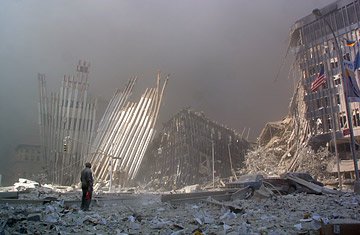
A man stands in the rubble, and calls out asking if anyone needs help, after the collapse of the first World Trade Center Tower in New York City on September 11, 2001.
(8 of 10)
But any blessings from Sept. 11 should be cherished, as the Marisa family knows. Shortly before 9 a.m., Kurt Marisa, 42, called his dad Rudy to ask if he had heard from Kurt's brother Kent, who worked in the American Express building across from the Trade Center. Rudy said Kent was fine, so Kurt returned to his duties--at the Pentagon. Within minutes, of course, a second plane would crash into the south tower; a third would hit the Pentagon. Now Rudy and his wife Jacquelyn couldn't reach either son. Rudy, a basketball coach, gamed out grim odds. "There was a good chance I could lose at least one."
It was around that time that Rudy heard about a fourth plane. It had slammed into Somerset County, Pa., only two counties away from his home in Waynesburg. Today all the Marisas are grateful to be alive. As they know, it is only shallow men who discount luck. --By John Cloud
The G Man
Until he retired from the FBI in August, John O'Neill, 49, was America's pit bull on terrorism. As head of the bureau's national-security operations in New York City, he oversaw investigations into the 1998 embassy bombings in Africa and the 2000 attack on the U.S.S. Cole in Yemen, both believed to be the work of groups linked to Osama bin Laden. Two weeks ago, O'Neill began a new job: chief of security at the World Trade Center.
The Yemenite government nicknamed O'Neill "Rambo." It did not use the name fondly. O'Neill didn't just request access and information from officials in Yemen; he demanded them. He insisted that his agents be allowed to carry automatic rifles for protection. Ultimately, O'Neill was barred from Yemen by U.S. Ambassador Barbara Bodine for irritating his hosts. His agents, however, were grateful for his unwavering intransigence. Said an admirer: "O'Neill has been thrown out of better places than that."
Because of his expertise, O'Neill knew exactly what terrorists could do. "A lot of these groups now have the capability and the support infrastructure in the U.S. to attack us here if they choose to," he said in 1997. Three years later, he made what could have been the defining mistake of his career: he left a briefcase full of national-security documents in a Tampa, Fla., hotel. The case was recovered unharmed, and the FBI declined to press charges. But O'Neill will not be remembered for that anomalous mistake. After the first strike on the Trade Center, it is believed he evacuated his 34th-floor office in the north tower. He made a few calls from the sidewalk--including one to his son to let him know he was unharmed and one to FBI headquarters. Then he went back in to help with the rescue effort. He has not been seen since. --By Josh Tyrangiel/Reported by Benjamin Nugent
Paws in the Dust
There are no tidy rules for working through grief. Dr. Larry Hawk, whose sister Kathy Nicosia was a flight attendant aboard American Airlines Flight 11, grieved through working. In the days following the crashes, Hawk manned one of the hundreds of triage units along Manhattan's West Side Highway. But his unit was unique. It was equipped with miniature IV bags, water bowls and dog food to rescue and revive the thousands of pets stranded in crumbling and evacuated buildings in lower Manhattan.
